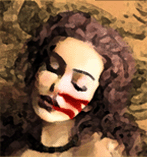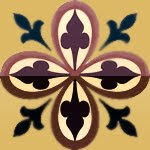برگردان: ح ف
این سان، در فقدانی
نگرانی زاده شد.
سیبِ فروافتاده ای - از همان شاخه ای که حوا
سیبِ خود را چید - در پای درخت فرو انداخته ای در حالِ پوسیدن
میوه ی ممنوعه. نامش: نگرانی
تصویرِ تهی بودگی در برابر تهی بودگی
فروبردنِ دندان در سیب، آیا حوا می دانست که دارد
روحش را می بلعد؟
چه می شد اگر کتاب تنها خاطره ی بی پایانِ فقدانِ یک واژه می بود؟
غیاب با غیاب سخن می گوید.
آدم گفت: "گذشته ام به دادخواهی ام بر می خیزد، اما آینده ام نمی خواهد این ها را در ظرف اش حفظ کند."
تصور کن روزی را بدونِ روزی در پس، شبی را
بدون شبی از پیش.
تصور کن هیچ را و چیزی را در میانه ی
هیچ.
چه می شد اگر به تو می گفتند این چیزِ ناچیز تو بودی؟
و خدا آدم را آفرید.
او را مردی آفرید، محروم از خاطره.
مردی بدون کودکی، بدون گذشته.
(بدون اشک ها، خنده ها و تبسم ها.)
مرد از هیچ عزیمت می کند، حتا عاجز از
دعویِ جزیی از این هیچ.
آیا خدا برای لحظه ای به این اندیشید که با یک ضربه
این مرد را محروم ساخت
از داشتن ِ آنچه که در آینده می خواست به تمامیِ آفریدگانِ دیگر ببخشد؟
آدم، پسرِ نیستی به خواستِ خدا، میوه یِ گشاده دستیِ شرورانه،
میوه ی رسیده پیش از موعد، درختِ تماماً برگ پوش پیش از رویش،
جهانِ به انجام رسیده پیش از برآمدن از نیستی، اما تنها در
ذهنِ خدا.
مردِ اندیشه هایِ غریب، با این همه، زندگی اش به همین ها بسته است.
مردِ زنجیر شده به تهی، زنجیر شده به غیابِ تماماً غایب
گذشته است که تسکین مان می دهد. اما مرد، بدونِ چنین امنیتی
پرتاب شده به سوی که، به سوی چیست؟
مرد بی نور یا بی سایه، بی خواستگاه، یا بی جاده،
بی مکان، مگر قسمی از مکان بیرونِ زمان
آن هم بی تفاوت برای مرد.
چیزها بایست حس کنند این راه را. اما بی تردید آنها هم حتا
شیء-خاطره ی خود را دارند، احضارِ چوب و آهن، رس و مرمر.
احضارِ جریان کند و آهسته شان به سوی ایده، معرفتِ شیئ، آنها برای تجسم بخشیدن اند.
آه تهی بودگی! هیچ چیز برای اتکا بر آن نیست، هیچ چیز برای آسودن بر آن نیز،
نگرانی این است؟
زمان شکل می دهدمان. بدون گذشته هیچ حالی در میان نیست، و من
نمی تواند به تصور درآید.
یتیم در مملو ترین معنای لفظ، از پدر
و از مادر، از خود نیز – آیا ما در آن
لمحه ی شهوانی و آن تجربه ی روحانی به هستی آورانده نشدیم؟ - چه دیدنی و چه
شنیدنی برای او می توانست باشد؟ چه معنی می توانست بدهد تکلم یا
کنش؟ چه وزنی دارد یک واژه، چه طنینی دارد
در آینده؟ چه رجحانی شاید برای او می داشت؟ چه جبرانی،
چه تسکینی می توانست انتظار داشته باشد از هر اشاره ای ؟
کشف ها، رو در رویی ها، شگفتی ها، نومیدی ها،
سرگشتگی؟ شاید. اما از چه رو، دیگری از راه می رسد،
در پاسخ به کدام پرسشِ درونی، در فقدانِ تمامِ قیاس ها؟
کلید در نطفه ای لقاح یافته خوابیده است، جنین.
راز و اعجاز.
فراموشیِ فراوان. وا می داردمان تا صدا کنیم روان و روح را
به نام روح و روان. یاری مان می دهد تا بیاشکاریم
راه های گونه گونِ آگاهی را، تا یاد بگیریم و از یاد ببریم، تا بستانیم آنچه را
پیشکش شده، خواه با سپیده دم خواه شبانه، روزانه، خلاصه، هر راهی تا خود را بیافرینیم.
اما من نیستم. همه ی آنچه من همیشه بوده ام مردی است که زندگی گذاشته
مرا تا باشم.
پس من وجود دارم، شکل یافته از بهترین و بدترین، از تمام آنان که من
دوست داشته ام یا گریزان بوده ام، یافته ام یا گم کرده ام، شکل یافته از ثانیه ها در
شفقتِ ثانیه ها، هم چنان که زندگی می کاهد از این ثانیه ها.
حوا از خوابِ آدم پدید آمد، در کنارِ او از خواب برخاست
به خواستِ خدا. حوا هم زنی بی اینکه زمانی کودکی بوده باشد،
بی اینکه دیده باشد بدنش را در حال رویش و رشد، ذهن اش را
گشوده می دید اما، به تمامی آزاد برای هوی و هوس های جنسی و شهوانی
یا پیکار با آنها.
خیره به هم بدون هیچ واژه ای. چه می توانستند
بگویند؟ فقط می توانستند مشاهده کنند، تنها می توانستند تفاوت های شان را بخوانند.
روزهایِ ملال، روزهایِ تشویش بدین سان دنبال می شد. نیز
روزهای اضطراب و نگرانی.
آنها اسبابِ بازی خداوند بودند. با هم زندگی می کردند، اما هنوز ناتوان از
دریافتن چیزی از یکدیگر. زندگی، اما هنوز بی هیچ نشانه ی برجسته ی
وجود، نه حتا تصویری یا چهره ای
تا بر این حقیقت پا فشارد که آنها واقعی اند. اما مگر بدنی مرموز و ذهنی ناتوان از تفکر نداشتند.
در آی ابلیس. با آوای تملق آمیزِ خزنده ات به عمقِ گوش های شان فرود آی،
آوایی که شاید تنها
آوای آنیِ نگرانی شان بود.
وه، باید دانست که در دل آنها نه فقط حس کنجکاوی،
که امیدی به التیام بود.چه که خدا کاشته بود
بذر رنج را در دل آنها، رنجش از هستی را. خدا دست به اشتباهی
برده بود. خدا خطا کرده بود.
چه می شد اگر گناهِ حوا در واقع گناهِ خدا می بود که حوا،
برای عشقِ خدا، بر خود روا داشته بود؟ هم گناهِ عشق به خدا
هم آرزوی مجنونانه برای رهانیدنِ خویش و رهایشِ آدم؟
نگرانی، الهام بخشِ او بود، شتاب در رسیدن
به آزادی شان.
نقض فرمانِ خدا، برای یکی
و دیگری، معنای انسانیت شان بود.
طبیعت، مترصدِ کین خواهیِ خود، گناهِ شهوانیِ آمیزش
جز گناهِ زایش چه خواهد بود، جز گناهِ ستایشِ نطفه.
ابدیتِ ناپایدارِ آنچه تولد یافته است.
آدم و حوا به یک چشم به هم زدن، بچه آوردند، از میان کودکی ای
که هرگز نداشتند، کودکانِ شکننده یِ آینده.
چه که خداوند از پیش ایشان را به سرنوشت شان وا نهاده بود، تنها برای اینکه آنها نیز یک به یک
او را ترک کنند. آزادی شان – آه تنهایی و
درد- انکارناپذیرانه از این ترکِ دوگانه سر بر کرده بود.
اما دو پرسش هنوز باقی می مانند.
آیا خدا می دانست، آن هنگام که مرد را آفرید، می توانست
هرگز مردی از او نسازد چه که خود به تنهایی هم می توانست
یک مرد شود؟
آیا ضعفِ حوا بعدها برای خدا و برایِ
آدم، درسی شد، محکی حیاتی به سوی آگاهی خاص شان
از وجود، به سوی پذیرشِ زندگی و مرگ؟
Send to:




